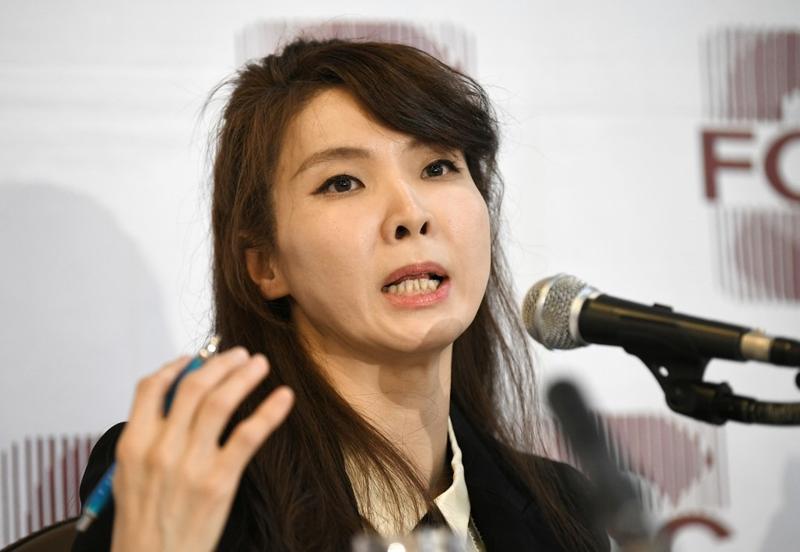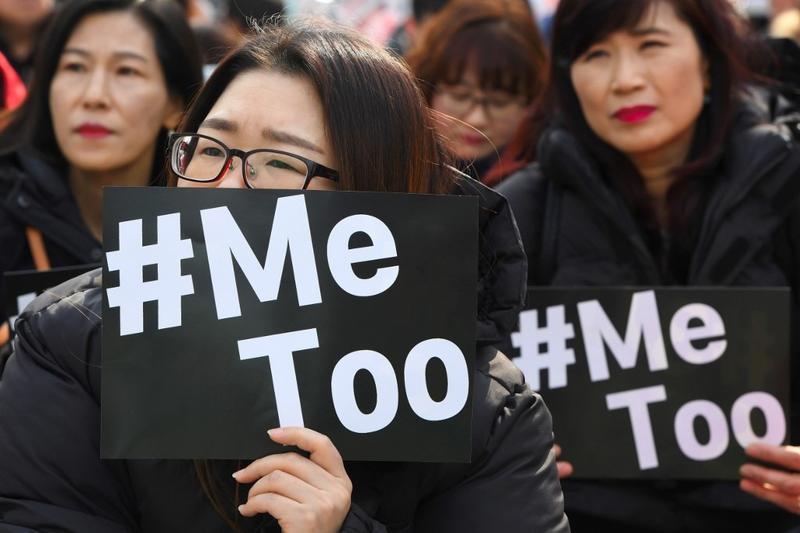 South Korean prosecutor Seo Ji-hyun speaks during a press conference with foreign correspondents in Seoul on Feb 7, 2020. Seo was the person who started South Korea's #MeToo movement in early 2018. (JUNG YEON-JE / AFP)
South Korean prosecutor Seo Ji-hyun speaks during a press conference with foreign correspondents in Seoul on Feb 7, 2020. Seo was the person who started South Korea's #MeToo movement in early 2018. (JUNG YEON-JE / AFP)
SEOUL - A high-profile case involving a former South Korean prosecutor who was jailed following an allegation that he had groped and then demoted his female colleague will be back in court, reopening old wounds and once again throwing the spotlight on the way women in the country are treated.
Addressing a roomful of foreign journalists in Seoul on Friday, the victim - Seo Ji-hyun, a South Korean prosecutor - was reduced to tears as she spoke.
Ahn Tae-geun, 53, was sentenced in January last year to two years' jail for abuse of power in his treatment of Seo, 46. Because of the country's statute of limitations, he was not charged with the sexual assault he was accused of.
Since South Korean prosecutor Seo Ji-hyun initiated the #MeToo movement in South Korea, public attitudes towards sexual abuse have changed, experts said
A year into his incarceration, the top court ordered a retrial, insisting that Ahn had the discretion to move her to a small provincial office.
On Jan 9, Ahn was released on bail. No date for the retrial has been set, but it means Seo, who started the country's #MeToo movement against sexual harassment in early 2018 by telling her story on television, will have to retell the story of how Ahn - then a powerful figure in the prosecutor's office - allegedly groped her at a funeral in 2010 and then used his influence to move her when she complained.
ALSO READ: #MeToo takes off in S. Korea, but justice harder to attain
Seo said she had held on to the belief that if upheld in the country's top court, the saga would be over.
"But the (recent) ruling came as quite a shock because it felt like it wasn't over," she said, with tears in her eyes. "I just couldn't accept (the ruling) and I will continue to fight against it."
While her story is typical of the uphill battle against gender inequality and sexual abuse that women have to endure in the deeply patriarchal country, experts say that since Seo initiated the #MeToo movement in South Korea, public attitudes towards sexual abuse have changed.
More female victims now dare to speak up against their abusers and tens of thousands of women have joined protests to demand their rights and greater protection of victims.
 South Korean demonstrators hold banners during a rally to mark International Women's Day as part of the country's #MeToo movement in Seoul, March 8, 2018. (JUNG YEON-JE / AFP)
South Korean demonstrators hold banners during a rally to mark International Women's Day as part of the country's #MeToo movement in Seoul, March 8, 2018. (JUNG YEON-JE / AFP)
In South Korea, victims are often counter-sued by their abusers who accuse them of being a kkotbaem (flower snake in Korean) - a term referring to women who seduce men to extort money from them.
The country's legal system, in particular, has not caught up with the people's desire for change, said Seo, who is now with the Justice Ministry.
Out of the 219 #MeToo-related laws tabled in Parliament in 2018, only 11 were passed, with most merely raising the maximum fines for sexual crimes.
Rape, Seo said, is still defined as violence and intimidation instead of a lack of consent. The law requires victims to prove that they had fought with all their might to stop their attacker.
Ahn Tae-geun's release - notably the first #MeToo case in South Korea - has dealt a blow to public confidence in the legal system
There is also little change in the government's policies related to women, she noted, even though South Korean President Moon Jae-in himself had called for a sweeping change in policies to create a new culture that is free from sexual harassment and assault.
Ahn's release - notably the first #MeToo case in South Korea - has also dealt a blow to public confidence in the legal system.
Kim Ye-ji from Korea YMCA Gender Equality Committee said the legal system is showing "tepid and indifferent attitudes towards condemning internal sexual violence" and allowing sexual violence against women to be "reproduced and consolidated".
ALSO READ: One-time presidential hopeful jailed in ROK #MeToo scandal
Disappointed with the court's decision, Seo said the ruling could discourage future whistle-blowers or victims of workplace sexual abuse from speaking out.
Even so, she said she will continue to do her part after joining the Justice Ministry last week, taking charge of gender equality and transforming organizational culture.
Since she started the #MeToo movement, the public has become less tolerant of sexual abuse with a slew of accusations bringing down politicians, the latest being 27-year-old Won Jong-gun, a future star of the ruling Democratic Party who was accused of rape by a former girlfriend.
READ MORE: S. Korean chat app becomes new outlet for #MeToo movement
A study by the Korean Confederation of Trade Unions last year showed that 52 percent of respondents said there were fewer sexual jokes now and displays of inappropriate behaviour that belittle women, according to the Hankyoreh newspaper.
"If there is one thing South Korea's #MeToo campaign managed to truly accomplish, I'd say it is this dramatic change in the way our society and our community view sexual assaults," said Seo.
"(It) rattled this deep-rooted culture of victim blaming... (and) made many people realise that sexual assault is something the abuser should be ashamed of, not the victims; that the fault lies not with the victims but with the society that tolerates abusers and stigmatises victims; and that sexual assault is not a private matter but a very public, systematic problem, and made people speak out."



